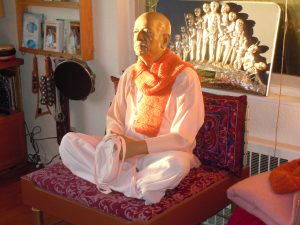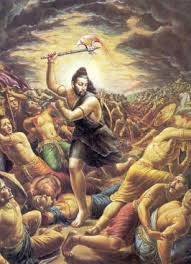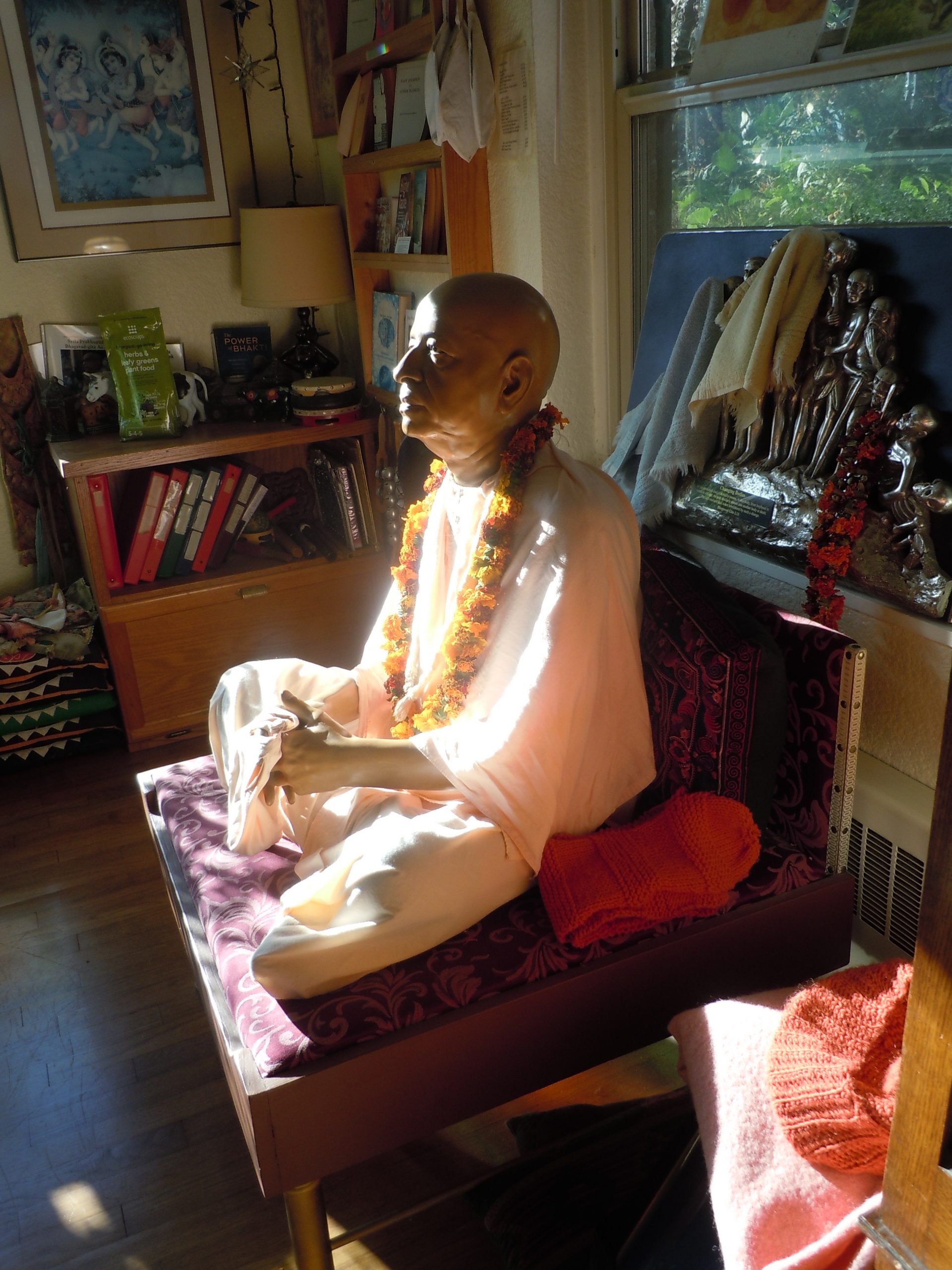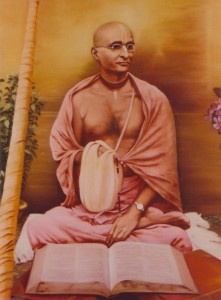
Hare Krsna-Below we have several quotes about the benefit of devotee association and what happens if we do NOT have it.
Prabhupada also explains how associating with him thru his books, and who never sees him physically– is just as good.
He also explains how we never compromise-but at the same time we do not make enemies-that is called tactics
He also likes the Lords prayer given by the Christians regarding the Holy Name
damaghosa das
———————
June 11 1974 Paris
Paramahaṁsa: My question is: A pure devotee, when he comments Bhagavad-gītā, someone who never sees him physically, but he just comes in contact with his commentary, explanation, is this the same thing?
Prabhupāda: Yes. You can associate with Kṛṣṇa by reading Bhagavad-gītā. And these saintly persons, they have given their explanations, comments. So where is the difficulty? Everyone is helping you.
Puṣṭa-kṛṣṇa: You’ve said that the Bhagavad-gītā is Kṛṣṇa’s mind.
Prabhupāda: Bhagavad-gītā is Kṛṣṇa. Kṛṣṇa is not different from His mind. Why do you say like that? This is material conception, the soul is different from body, the mind is different from soul. But Kṛṣṇa has no such difference. Therefore He’s called absolute. Advaya-jñāna. His mind and Kṛṣṇa are the same. Kṛṣṇa and His name is the same. Kṛṣṇa and His words are the same. This is Kṛṣṇa understanding. Jesus Christ simply said that “Hallowed be Thy name.” That means there is name. Now the question is why he did not say or utter the name? Now, there is already name. Why should he utter?
Puṣṭa-kṛṣṇa: Right.
Prabhupāda: There is already name, Kṛṣṇa. So why should he utter?
Paramahaṁsa: Is that why Christ didn’t utter the name of Kṛṣṇa?
Prabhupāda: No, he said, “Hallowed be Thy name. Hallowed be Thy name.” So there is name already. That means he gave you chance to find out the name. And as he came to India, so you come to India and you’ll get the name.
Puṣṭa-kṛṣṇa: He was helping to lay the foundation for saṅkīrtana movement.
Prabhupāda: Yes. “Hallowed be Thy name.” Yes. This is a chance for others to think, “Hallowed be Thy name.” The name is glorified. “So where the name is glorified? Find out.”
Bhagavān: I think we can turn around, this way.
Devotee: Let’s go up by the river.
Bhagavān: Well, we have to go all the way round the lake to get to the car again.
Prabhupāda: Hare Kṛṣṇa.
Nitāi: Did you want to know where that was, “Hallowed be Thy name.”?
Prabhupāda: Eh?
Nitāi: Were you asking where that was from?
Prabhupāda: No, you said. Somebody said it is, Christ said…
Nitāi: That’s in what they call the Lord’s Prayer, which was given by Christ himself. All the Catholics say that daily.
Prabhupāda: Eh?
Nitāi: The Catholics repeat that prayer daily.
Prabhupāda: What is that?
Nitāi: The Lord’s Prayer.
Prabhupāda: What is that prayer?
Puṣṭa-kṛṣṇa: One devotee, he asked to Christ, “How should I pray?”
Prabhupāda: Hmm.
Puṣṭa-kṛṣṇa: He said, “Our Father who art in heaven, hallowed be Thy name. Thy kingdom come, Thy will be done on earth as it is in heaven. Give us this day our daily bread, and forgive us our trespasses, as we forgive those who trespass against us. Lead us not into temptation, but deliver us from evil, for Thine is the kingdom and the power and the glory for ever and ever.”
Prabhupāda: Very nice prayer. Very nice prayer. (pause)
Puṣṭa-kṛṣṇa: This is vandanam. Yes, Śrīla Prabhupāda?
Prabhupāda: Hmm.
Nitāi: Śrīla Prabhupāda, is there some gradual development in all those nine processes of devotional service, beginning from hearing?
Prabhupāda: Yes. Ādau śraddhā tataḥ sādhu-saṅgaḥ [Cc. Madhya 23.14-15]. This chanting and hearing should be in the association of devotees. First of all, one must have faith that chanting is good. Then he should chant in the society of the devotees. Then it will develop. He can chant anywhere. But if he chants along… Therefore saṅkīrtana. Bahubhir milita. Many devotees, chanting together, that is called saṅkīrtana. So one, our movement is saṅkīrtana movement, many devotees together would chant the holy name of God. Then it is very quickly successful. Just like a person who comes to our center in the association of the devotees, after few weeks, he also becomes devotee. Quickly. And there are many others, they are seeing that there is a group like this, but because they do not come, they do not understand. Therefore the quick development process is to execute devotional service in the association of devotees, sādhu-saṅga [Cc. Madhya 22.83].
sādhu-saṅga, sādhu-saṅga—sarva-śāstre kaya lava-mātra sādhu-saṅge sarva-siddhi haya [Cc. Madhya 22.54]
Caitanya Mahāprabhu says that sādhu-saṅga, association of devotees, is very, very important. Even for a moment, if there is association, he immediately comes to the path of perfection. (pause) So if you actually remain a sādhu, devotee, then anyone who will come with your association, he’ll be perfect by association. Means, this process of perfection will begin immediately.
Paramahaṁsa: Our position in preaching should be to encourage people in all respects to associate with us.
Prabhupāda: Yes.
Paramahaṁsa: That means sometimes we might have to compromise in certain ways.
Prabhupāda: Why compromise? You don’t compromise. Then you associate with him. If you make compromise, then you associate with him. Then gradually you’ll also go down. When we, when we see some person, we do not associate with him, but we give him chance to associate with me. Why you should make compromise? What is the reason? If you know something positively, why should you make compromise? When people come to talk with me, see me, I don’t make any compromise. Do I make any compromise?
Devotees: No.
Prabhupāda: Then why shall we make compromise? That gentleman, Mr. Herbert, Gene Herbert, he said that “It has taken eighteen years to write these books.” I said, “Still, there are so many mistakes.” Immediately I said. And he could not say anything. Do you remember that?
Devotees: Yes.
Prabhupāda: Immediately I said, “Yes, you have labored eighteen years. Still, there are so many mistakes.”
Nitāi: Anyone else would have said, “Oh! Very nice.”
Prabhupāda: (laughs) Eh? I did not say.
Puṣṭa-kṛṣṇa: He said that morning “What can we do, Prabhupāda?” He said, “What can we do? If we do not compromise, we will make enemies.”
Prabhupāda: No, you’ll not compromise; at the same time, you’ll not make enemies. That is tactics. If you make enemies, then what is your tactics? You must speak the truth; at the same time he’ll not be displeased. That is tactics. If you can defeat him by your argument, then he’ll not be displeased. After all, everyone is human being. If you can find out his defect, why he shall be enemy? Therefore, it is said, “You better make a reasonable man an enemy, but don’t make a friend fool.” You don’t make friendship with a fool, but if a man is intelligent, better make him an enemy. Because, because he’s intelligent, although he’s an enemy, he’ll not do any harm. Because intelligent. But a fool, he may pose himself as friend, and he can do anything which is very harmful.
—————————————————————
March 28 1966 NY lecture-
This is called sato vṛtti, sat-saṅga. Sat-saṅga means association with good persons who are engaged, if not cent percent, at least engaged, certain portion of his life for spiritual realization.
So these six things are required for making progress in spiritual life. Similarly, there are six other things also which will degrade us from the spiritual life.
SB purport 4.9.11–The significant point in Dhruva Mahārāja’s statement is that he wanted the association of pure devotees. Transcendental devotional service cannot be complete and cannot be relishable without the association of devotees. We have therefore established the International Society for Krishna Consciousness. Anyone who is trying to be aloof from this Krishna Consciousness Society and yet engage in Kṛṣṇa consciousness is living in a great hallucination, for this is not possible. From this statement by Dhruva Mahārāja it is clear that unless one is associated with devotees, his devotional service does not mature; it does not become distinct from material activities.
Madhya 19.157-–Śrī Caitanya Mahāprabhu has said: asat-saṅga-tyāga,-ei vaiṣṇava-ācāra. The first business of a Vaiṣṇava is to give up the company of nondevotees. A so-called mature devotee, however, commits a great offense by giving up the company of pure devotees. The living entity is a social animal, and if one gives up the society of pure devotees, he must associate with nondevotees (asat-saṅga). By contacting nondevotees and engaging in nondevotional activities, a so-called mature devotee will fall victim to the mad elephant offense. Whatever growth has taken place is quickly uprooted by such an offense. One should therefore be very careful to defend the creeper by fencing it in-that is, by following the regulative principles and associating with pure devotees.
If one thinks that there are many pseudo devotees or nondevotees in the Kṛṣṇa Consciousness Society, one can keep direct company with the spiritual master, and if there is any doubt, one should consult the spiritual master. However, unless one follows the spiritual master’s instructions and the regulative principles governing chanting and hearing the holy name of the Lord, one cannot become a pure devotee. By one’s mental concoctions, one falls down. By associating with nondevotees, one breaks the regulative principles and is thereby lost.
Aug 7 1975 Toronto conversations...
Indian Man (2): …like your company very much in Toronto and we feel like talk you so much, but we don’t have so much time to talk with you. You have so much mercy, so we have not… know so much about Kṛṣṇa from you.
Prabhupāda: So in my absence you read the books. What I talk, I have written in the books. That’s all.
Indian Man (2): Personally, we think more greater.
Prabhupāda: That’s all right. But still, you can associate with me by reading my books.
Indian Man (2): I am reading books Prabhupāda. That books are your very, very good and most blessful to us. It is the biggest good will upon whole of universe at present, I think. By that knowledge, from dog to, I have become… I feel like I have something in my property of your books in my home. That’s the only property I feel that I have, this one. I was misled, misguided in this country.
Some Conclusions-
The above conversations and purports contain much valuable information-for the serious devotees. Those who are not serious will find these instructions unpalatable. Here is one of them...
..” Transcendental devotional service cannot be complete and cannot be relishable without the association of devotees. … Anyone who is trying to be aloof from this Krishna Consciousness Society and yet engage in Kṛṣṇa consciousness is living in a great hallucination, for this is not possible. From this statement by Dhruva Mahārāja it is clear that unless one is associated with devotees, his devotional service does not mature; it does not become distinct from material activities.
That’s the first one. Here is yet another one…
A so-called mature devotee, however, commits a great offense by giving up the company of pure devotees. The living entity is a social animal, and if one gives up the society of pure devotees, he must associate with non-devotees (asat-saṅga). By contacting non-devotees and engaging in non-devotional activities, a so-called mature devotee will fall victim to the mad elephant offense. Whatever growth has taken place is quickly uprooted by such an offense. One should therefore be very careful to defend the creeper by fencing it in-that is, by following the regulative principles and associating with pure devotees.
So the final conclusions is this-sure iskcon is ruined, and sure society has made it almost impossible to physically associate anymore-but there is ONE good thing about technology-we can still meet and associate with Prabhupanugas by telephone and video conferencing. These groups are out there and one should find one and get involved in them
Hare Krsna
damaghosa das




